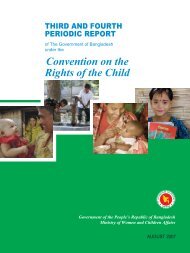Government-funded programmes and services for vulnerable - Unicef
Government-funded programmes and services for vulnerable - Unicef
Government-funded programmes and services for vulnerable - Unicef
Create successful ePaper yourself
Turn your PDF publications into a flip-book with our unique Google optimized e-Paper software.
<strong>Government</strong>-<strong>funded</strong> <strong>programmes</strong> <strong>and</strong> <strong>services</strong> <strong>for</strong> <strong>vulnerable</strong> children in SA<br />
recognise <strong>and</strong> respond to children’s needs (RAPCAN 2009). In consequence, the <strong>services</strong><br />
provided by the Act are underutilised by children. Lisa Vetten (2009) reveals that in 48–69<br />
per cent of reported cases of domestic violence, the complainant refers to abuse of others,<br />
<strong>and</strong> in most cases these are children. Despite the significant exposure of children to<br />
domestic violence, almost no complaints are made or protection orders sought in terms of<br />
the Act, directly by or on behalf of children (Vetten 2009).<br />
The attitudes of many police officers constitute a barrier to access to the protection <strong>services</strong><br />
af<strong>for</strong>ded by the Domestic Violence Act. Police officers are reluctant to exercise the wide<br />
protective powers of arrest af<strong>for</strong>ded to them by the Act. The reluctance is premised on a<br />
widespread perception among police officers that domestic violence is a ‘family matter’<br />
which they have no right to involve themselves in (Legal Resources Centre & POWA 2009).<br />
Despite the clear directive to police officers in terms of the Act <strong>and</strong> the undertakings<br />
made by the SAPS to victims of domestic violence, many police officers do not provide<br />
the necessary <strong>and</strong> prescribed <strong>services</strong>. This includes a failure in many cases to investigate<br />
telephonic reports of domestic violence, as required, by sending out a police van; a failure<br />
to assist with the service of court papers on the accused; a failure to refer complainants<br />
to shelters or organisations that can assist them; a failure to assist complainants to obtain<br />
medical assistance or to provide them with the necessary <strong>for</strong>ms <strong>for</strong> completion by a<br />
registered medical practitioner in the case of a criminal case being opened.<br />
The reasons <strong>for</strong> these multiple failures include a lack of knowledge of their obligations by<br />
police officers; a lack of training related to domestic violence <strong>services</strong>; lack of sufficient<br />
resources, such as police vans <strong>and</strong> staff; lack of sufficient budget <strong>for</strong> the implementation<br />
of the Act; <strong>and</strong> the deprioritisation of domestic violence cases by police officers, who<br />
regard other criminal matters as being of greater urgency (Legal Resources Centre &<br />
POWA 2009; RAPCAN 2009).<br />
Child protection police <strong>services</strong> weakened<br />
The specialised family violence, child protection <strong>and</strong> sexual offences (FCS) <strong>services</strong><br />
provided by the FCS units have been weakened by the restructuring of these units<br />
undertaken by SAPS in 2006. The restructuring process saw the decentralisation of these<br />
<strong>services</strong> from dedicated units which existed at area level downwards to station level. In<br />
essence, this amounted to the dissolution of the units. The rationale behind this move was<br />
explained as follows by the SAPS:<br />
The abuse <strong>and</strong> violation of women <strong>and</strong> children takes place in a policing<br />
precinct. The first place where a sexual offence against a child is reported is<br />
at a police station. Currently FCS Units are not based at police stations, but at<br />
separate offices a distance apart with a single unit often serving a total of 28<br />
police stations. The police officials at these units are sometimes not readily<br />
available after hours <strong>and</strong> over weekends which can result in a child-victim <strong>and</strong><br />
his or her parents waiting up to two to three days <strong>for</strong> expert assistance from the<br />
police. (in Frank et al. 2008: 60)<br />
The restructuring process has spread the <strong>services</strong> more widely, but has at the same time<br />
weakened the FCS <strong>services</strong> provided by the SAPS (Frank et al. 2008). The restructuring<br />
has resulted in, inter alia, the placement at station level of police officers to deal with<br />
child protection <strong>and</strong> family violence who are not suitably qualified to provide these<br />
<strong>services</strong>, who are not suitably experienced, who did not undergo specialised screening <strong>for</strong><br />
suitability, <strong>and</strong> who do not have some of the basic requirements, such as a driver’s licence.<br />
224
















